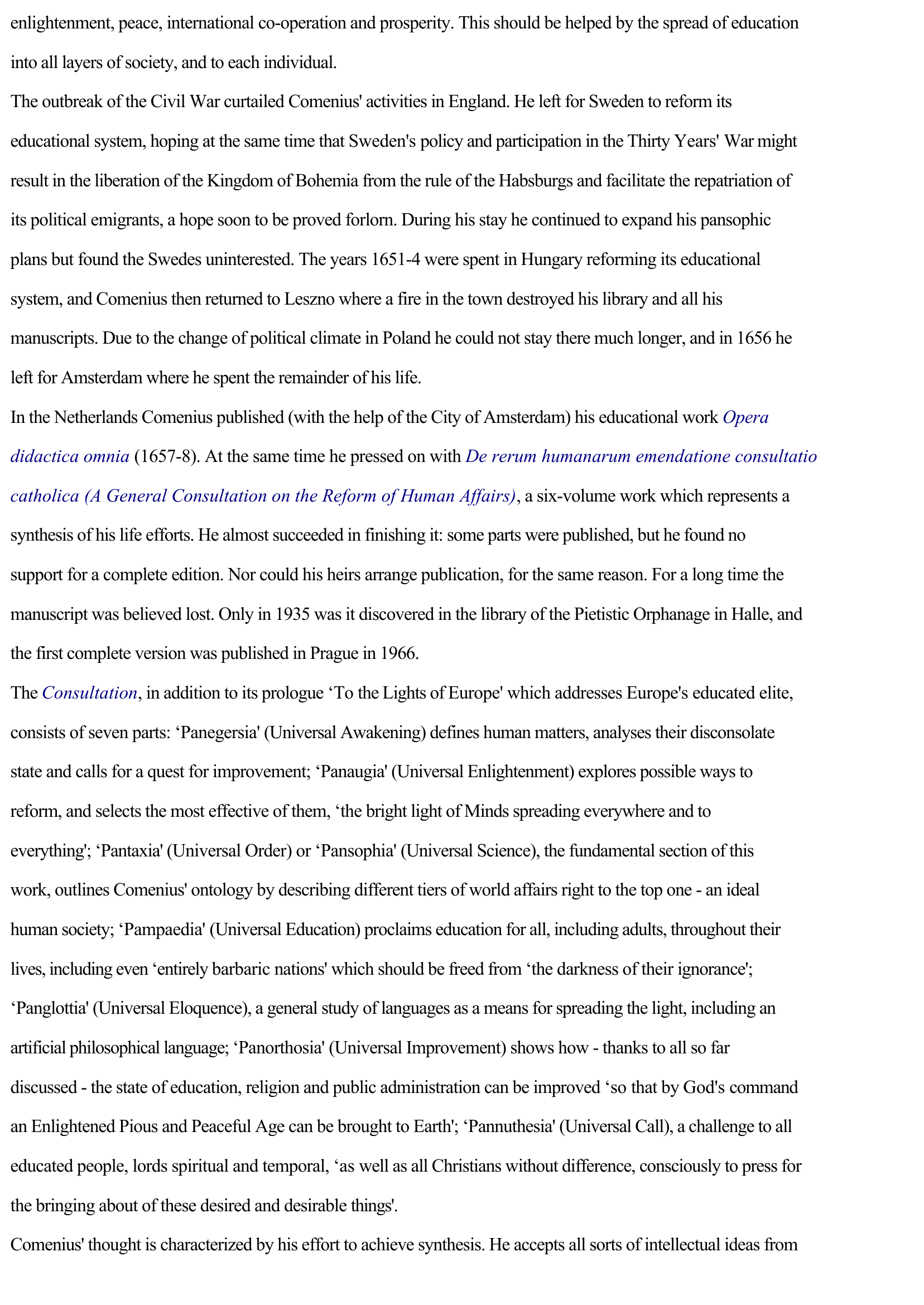Comenius, John Amos
Publié le 22/02/2012

Extrait du document
«
enlightenment, peace, international co-operation and prosperity.
This should be helped by the spread of education
into all layers of society, and to each individual.
The outbreak of the Civil War curtailed Comenius' activities in England.
He left for Sweden to reform its
educational system, hoping at the same time that Sweden's policy and participation in the Thirty Years' War might
result in the liberation of the Kingdom of Bohemia from the rule of the Habsburgs and facilitate the repatriation of
its political emigrants, a hope soon to be proved forlorn.
During his stay he continued to expand his pansophic
plans but found the Swedes uninterested.
The years 1651-4 were spent in Hungary reforming its educational
system, and Comenius then returned to Leszno where a fire in the town destroyed his library and all his
manuscripts.
Due to the change of political climate in Poland he could not stay there much longer, and in 1656 he
left for Amsterdam where he spent the remainder of his life.
In the Netherlands Comenius published (with the help of the City of Amsterdam) his educational work Opera
didactica omnia (1657-8).
At the same time he pressed on with De rerum humanarum emendatione consultatio
catholica (A General Consultation on the Reform of Human Affairs) , a six-volume work which represents a
synthesis of his life efforts.
He almost succeeded in finishing it: some parts were published, but he found no
support for a complete edition.
Nor could his heirs arrange publication, for the same reason.
For a long time the
manuscript was believed lost.
Only in 1935 was it discovered in the library of the Pietistic Orphanage in Halle, and
the first complete version was published in Prague in 1966.
The Consultation , in addition to its prologue ‘To the Lights of Europe' which addresses Europe's educated elite,
consists of seven parts: ‘Panegersia' (Universal Awakening) defines human matters, analyses their disconsolate
state and calls for a quest for improvement; ‘Panaugia' (Universal Enlightenment) explores possible ways to
reform, and selects the most effective of them, ‘the bright light of Minds spreading everywhere and to
everything'; ‘Pantaxia' (Universal Order) or ‘Pansophia' (Universal Science), the fundamental section of this
work, outlines Comenius' ontology by describing different tiers of world affairs right to the top one - an ideal
human society; ‘Pampaedia' (Universal Education) proclaims education for all, including adults, throughout their
lives, including even ‘entirely barbaric nations' which should be freed from ‘the darkness of their ignorance';
‘Panglottia' (Universal Eloquence), a general study of languages as a means for spreading the light, including an
artificial philosophical language; ‘Panorthosia' (Universal Improvement) shows how - thanks to all so far
discussed - the state of education, religion and public administration can be improved ‘so that by God's command
an Enlightened Pious and Peaceful Age can be brought to Earth'; ‘Pannuthesia' (Universal Call), a challenge to all
educated people, lords spiritual and temporal, ‘as well as all Christians without difference, consciously to press for
the bringing about of these desired and desirable things' .
Comenius' thought is characterized by his effort to achieve synthesis.
He accepts all sorts of intellectual ideas from.
»
↓↓↓ APERÇU DU DOCUMENT ↓↓↓
Liens utiles
- Jan Amos Komensky dit Comenius à Nivnice (Moravie)
- Comenius (Jan Amos Komensky)
- John Locke et les lois - extrait du Second traité du gouvernement civil
- ANABASE, poème de Saint-John Perse
- ÉLOGES Saint-John Perse (résumé & analyse)


